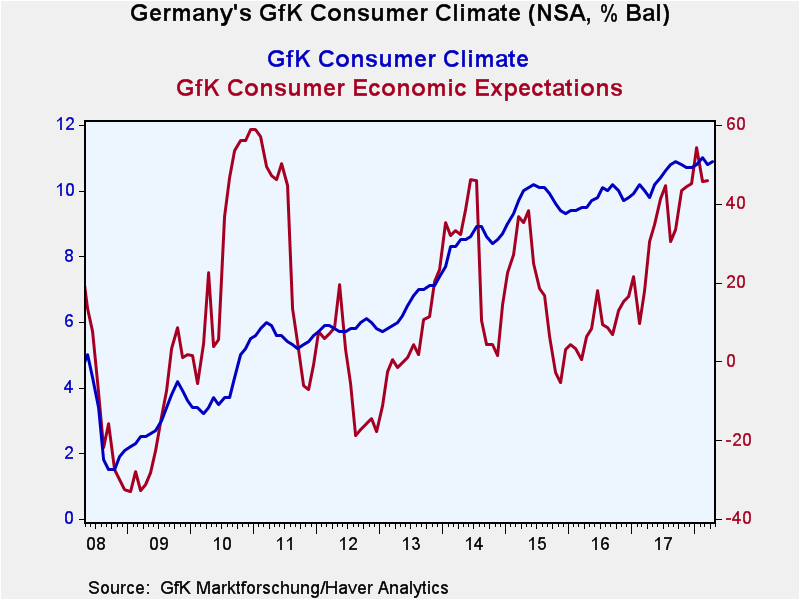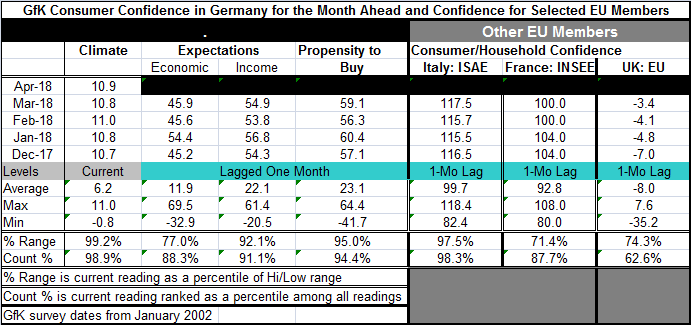 Global| Mar 28 2018
Global| Mar 28 2018German Consumer Confidence Holds the High Ground
Summary
The look-ahead consumer climate metric from GfK for Germany shows an uptick in April. Confidence sits in the top 2 percentile of its historic rank of all confidence measures for Germany since early-2002. The components for the GfK [...]
 The look-ahead consumer climate metric from GfK for Germany shows an uptick in April. Confidence sits in the top 2 percentile of its historic rank of all confidence measures for Germany since early-2002.
The look-ahead consumer climate metric from GfK for Germany shows an uptick in April. Confidence sits in the top 2 percentile of its historic rank of all confidence measures for Germany since early-2002.
The components for the GfK indicator are released with a lag. Each of the three components shows strong readings with two of the three metrics (income and buying propensity) residing above the 90th percentile of their respective queues of value. The economic expectations component resides in its 88th percentile, a still-strong reading.
The table also offers comparisons with France and Italy, the next two largest economies in the EMU, as well as the U.K. whose secessionist actions from the EU have impacted adversely its confidence readings.
Despite a difficult economic environment in which Italian GDP has not yet regained its pre-recession level of GDP, Italian consumer confidence stands at the 97th percentile of its historic queue of readings since 2002. In addition, Italy is undergoing substantial political disharmony; yet, none of that has harmed consumer confidence which continues to rise smartly in March.
In France, confidence fell two months ago. This month’s reading has held that same lower reading. French confidence stands in the 87.7 percentile of its historic queue of data. .
The U.K. has the lowest standing in this group, at its 62nd percentile of its historic queue of readings. However, the U.K. reading has been rising from even weaker readings as the Brexit process continues and as the pound sterling has been recovering. The Bank of England has put the U.K. in the tightening cycle by having started to raise rates, but it has been slow about following up the first rate hike with a second one.
On balance, these country-sourced measures agree with what the overarching EU Commission indexes have been saying about consumer confidence. Confidence on the part of consumers is very high. One thing this clearly means is that consumers feel good about job security. That is one of the most important elements in consumers being confident.
Consumer confidence is a bit of an odd statistic. It does not always signal how consumers are going to change their spending habits, which is one of the main things we want to know about their behavior. For now we have good signals from consumers and growth is still on track. These are positive signals for the EMU as well as for the U.K. economy moving forward.

Robert Brusca
AuthorMore in Author Profile »Robert A. Brusca is Chief Economist of Fact and Opinion Economics, a consulting firm he founded in Manhattan. He has been an economist on Wall Street for over 25 years. He has visited central banking and large institutional clients in over 30 countries in his career as an economist. Mr. Brusca was a Divisional Research Chief at the Federal Reserve Bank of NY (Chief of the International Financial markets Division), a Fed Watcher at Irving Trust and Chief Economist at Nikko Securities International. He is widely quoted and appears in various media. Mr. Brusca holds an MA and Ph.D. in economics from Michigan State University and a BA in Economics from the University of Michigan. His research pursues his strong interests in non aligned policy economics as well as international economics. FAO Economics’ research targets investors to assist them in making better investment decisions in stocks, bonds and in a variety of international assets. The company does not manage money and has no conflicts in giving economic advice.
More Economy in Brief
 Global| Feb 05 2026
Global| Feb 05 2026Charts of the Week: Balanced Policy, Resilient Data and AI Narratives
by:Andrew Cates






